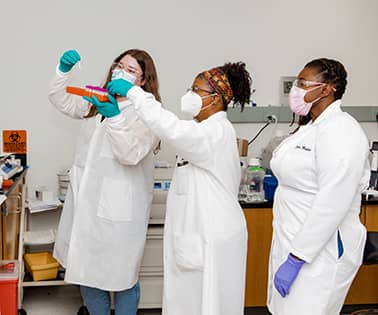Infectious diseases know no borders. “Due to climate change, increased travel and immigration, many of the diseases we study are expanding the geographies in which they occur”, explains Dr. Swati Gupta, Vice President and Head of Emerging Infectious Diseases at IAVI. IAVI's mission is to translate scientific discoveries into globally accessible and affordable public health solutions. Dr. Gupta said: “We develop vaccines and therapeutics that will be affordable and accessible to local communities, so countries can respond promptly when outbreaks occur. We don’t want another outbreak to turn into the next pandemic.”

IAVI is a non-profit product development partnership (PDP) that was founded in 1996 as a response to the slow progress toward the development of an HIV vaccine. Since then, IAVI has made significant contributions to a better understanding of HIV and the design of promising HIV vaccine candidates and antibodies.
Today, their portfolio extends beyond HIV to include tuberculosis as well as a range of emerging infectious diseases (EIDs). With labs, offices and collaborative clinical research centres in Africa, India, Europe and the US, IAVI can conduct end-to-end product development, from designing vaccine and antibody constructs to licensure and ensuring these products will be equitably affordable and accessible to the public - particularly in low- and middle-income countries.
Dr. Gupta
Strengthening health architecture through collaboration
IAVI’s way of working is highly collaborative in nature. Dr. Gupta said: “We work hand in hand with communities in Africa and India, where these diseases are most prevalent, to build upon local expertise and strengthen local health architecture. Through knowledge and technology transfers to laboratories, we work with these sites to expand clinical trial capacity and conduct cutting-edge clinical research. We engage with communities to help them understand the ins and outs of conducting clinical trials and to inform best practices. We offer training, mentorship, and advanced degree programs, including on how to write grants, leading to more African- and Indian-led scientific publications and supporting the next generation of scientific leadership in the region.”
Strengthening health architecture locally contributes to improving public health globally. While the diseases IAVI addresses impose a disproportionate burden on people living in poverty, they are not limited to low-income countries. Dr. Gupta shared: “Our world is interconnected. With increased travel and migration, HIV and TB are becoming more prevalent in populations across Europe. Due to climate change, EIDs such as Marburg virus, Sudan Ebolavirus and Lassa fever are gaining territory across Africa. As countries are getting hotter and wetter, the vectors for these diseases are spreading. Just recently we’ve seen cases of Lassa fever pop up in France and the UK. That’s why equitable access to public health solutions is of global importance.”
Pandemic preparedness
Addressing EID threats is essential to improving pandemic preparedness. One way of doing so is by increasing people’s understanding of EIDs and identifying risk factors. “Many EIDs are being underestimated. We conduct epidemiology studies to increase our understanding of a disease, including its distribution, public health burden, and patterns of transmission, and share these findings with local authorities and public health groups.”, as Dr. Gupta explained. A second aspect is vaccine development. By developing vaccines and making them globally accessible, countries can address outbreaks promptly and effectively – thereby minimizing the risk of future pandemics. Dr. Gupta shared: “IAVI is using a promising platform technology that has already been licensed for Merck’s Ebola Zaire vaccine, ERVEBO, so we are hopeful of advancing these vaccines forward through the clinical pipeline.”
Working with the Global Health Hub
In the past 25 years, IAVI has formed over 150 alliances with leading global and national organizations. One of those partnerships is with the Dutch Ministry of Foreign Affairs and the Dutch Global Health Hub. IAVI is the only PDP with an office in the Netherlands, which has made it easier to tap into the Dutch R&D ecosystem. Dr. Gupta highlighted: “Thanks to Dutch investment, we’ve been able to establish valuable scientific collaborations that are central to our shared mission of advancing global health. The Dutch government facilitated our partnership with Batavia Biosciences, a contract development and manufacturing organisation. They produce the clinical trial materials for the EID trials we conduct. The Dutch Global Health Hub has also brought us new advocacy partners that help us advocate for the resources and support needed to further health innovations across the board.”
IAVI envisions a world where all people have equitable access to safe, innovative vaccines and therapeutics; and where countries are well-equipped to resolve local and regional outbreaks before they turn into pandemics. It’s a major undertaking that requires extensive funding, planning, collaboration and capacity strengthening. Dr. Gupta said: “Despite the many challenges we face, this work is where our hearts are. Looking back over the past 25 years – at the partnerships we’ve formed, the capacity and infrastructure we’ve built, and the vaccines we’re developing - we see our efforts are paying off. We’re optimistic about the future. COVID-19 has sparked a lot of urgency, and initiatives like the Dutch Global Health Hub are instrumental to helping us move forward.”